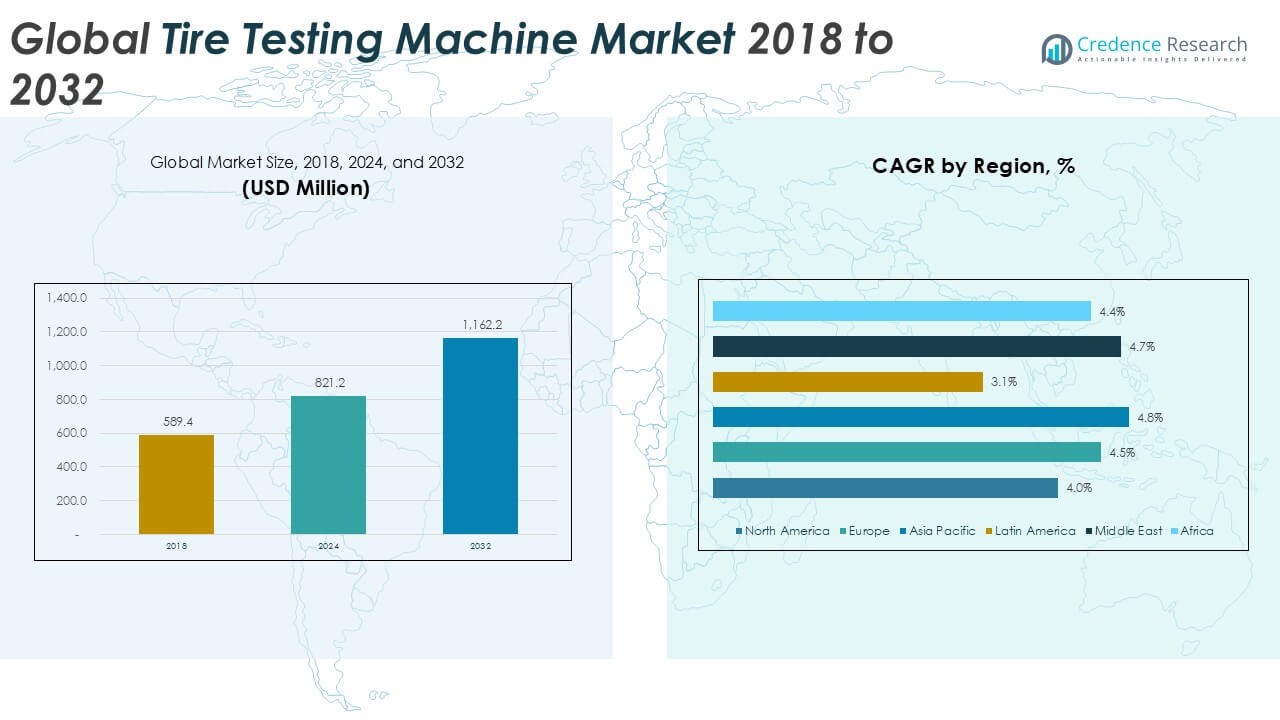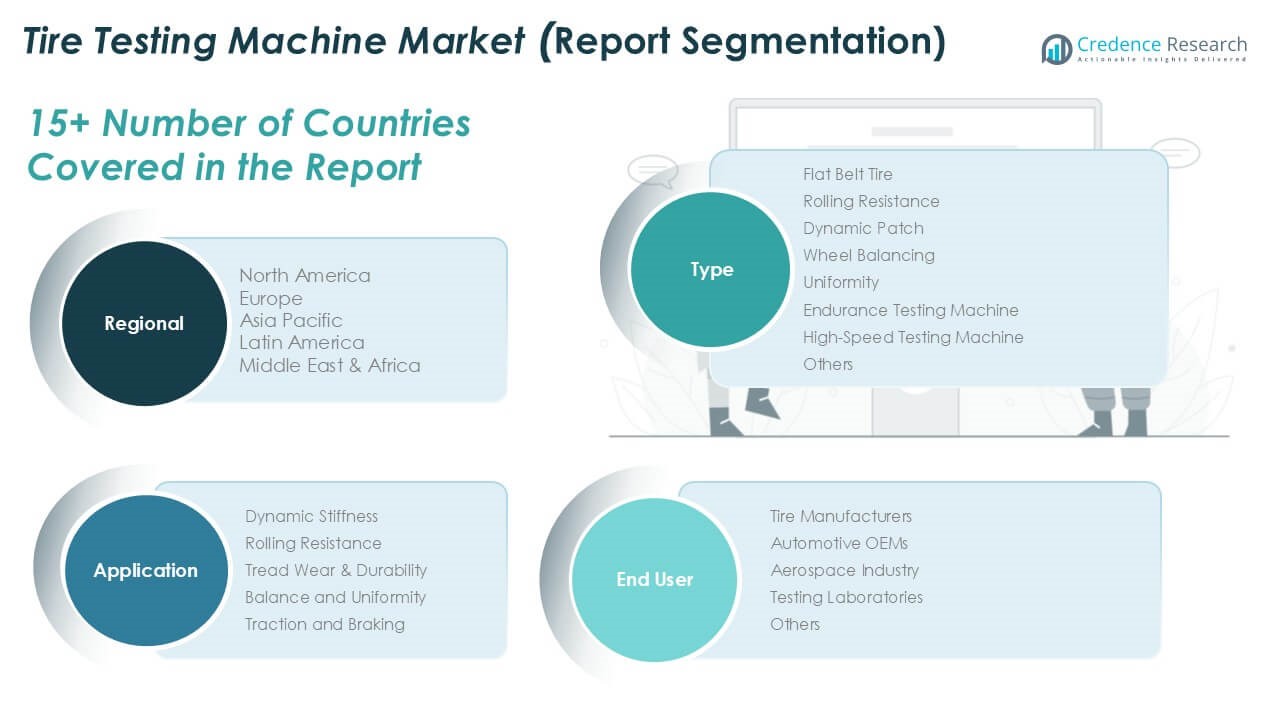CHAPTER NO. 1 : GENESIS OF THE MARKET
1.1 Market Prelude – Introduction & Scope
1.2 The Big Picture – Objectives & Vision
1.3 Strategic Edge – Unique Value Proposition
1.4 Stakeholder Compass – Key Beneficiaries
CHAPTER NO. 2 : EXECUTIVE LENS
2.1 Pulse of the Industry – Market Snapshot
2.2 Growth Arc – Revenue Projections (USD Million)
2.3. Premium Insights – Based on Primary Interviews
CHAPTER NO. 3 : TIRE TESTING MACHINE MARKET FORCES & INDUSTRY PULSE
3.1 Foundations of Change – Market Overview
3.2 Catalysts of Expansion – Key Market Drivers
3.2.1 Momentum Boosters – Growth Triggers
3.2.2 Innovation Fuel – Disruptive Technologies
3.3 Headwinds & Crosswinds – Market Restraints
3.3.1 Regulatory Tides – Compliance Challenges
3.3.2 Economic Frictions – Inflationary Pressures
3.4 Untapped Horizons – Growth Potential & Opportunities
3.5 Strategic Navigation – Industry Frameworks
3.5.1 Market Equilibrium – Porter’s Five Forces
3.5.2 Ecosystem Dynamics – Value Chain Analysis
3.5.3 Macro Forces – PESTEL Breakdown
CHAPTER NO. 4 : KEY INVESTMENT EPICENTER
4.1 Regional Goldmines – High-Growth Geographies
4.2 Product Frontiers – Lucrative Type Categories
4.3 End User Sweet Spots – Emerging Demand Segments
CHAPTER NO. 5: REVENUE TRAJECTORY & WEALTH MAPPING
5.1 Momentum Metrics – Forecast & Growth Curves
5.2 Regional Revenue Footprint – Market Share Insights
5.3 Segmental Wealth Flow – Type, Application, and End User Revenue
CHAPTER NO. 6 : TRADE & COMMERCE ANALYSIS
6.1. Import Analysis By Region
6.1.1. Global Tire Testing Machine Market Import Revenue By Region
6.2. Export Analysis By Region
6.2.1. Global Tire Testing Machine Market Export Revenue By Region
CHAPTER NO. 7 : COMPETITION ANALYSIS
7.1. Company Market Share Analysis
7.1.1. Global Tire Testing Machine Market: Company Market Share
7.2. Global Tire Testing Machine Market Company Revenue Market Share
7.3. Strategic Developments
7.3.1. Acquisitions & Mergers
7.3.2. New Type Launch
7.3.3. Regional Expansion
7.4. Competitive Dashboard
7.5. Company Assessment Metrics, 2024
CHAPTER NO. 8 : TIRE TESTING MACHINE MARKET – BY TYPE SEGMENT ANALYSIS
8.1. Tire Testing Machine Market Overview By Type Segment
8.1.1. Tire Testing Machine Market Revenue Share By Type
8.2. Flat Belt Tire
8.3. Rolling Resistance
8.4. Dynamic Patch
8.5. Wheel Balancing
8.6. Uniformity
8.7. Endurance Testing Machine
8.8. High-Speed Testing Machine
8.9. Others
CHAPTER NO. 9 : TIRE TESTING MACHINE MARKET – BY APPLICATION SEGMENT ANALYSIS
9.1. Tire Testing Machine Market Overview By Application Segment
9.1.1. Tire Testing Machine Market Revenue Share By Application
9.2. Dynamic Stiffness
9.3. Rolling Resistance
9.4. Tread Wear & Durability
9.5. Balance and Uniformity
9.6. Traction and Braking
CHAPTER NO. 10 : TIRE TESTING MACHINE MARKET – BY END USER SEGMENT ANALYSIS
10.1. Tire Testing Machine Market Overview By End User Segment
10.1.1. Tire Testing Machine Market Revenue Share By End User
10.2. Tire Manufacturers
10.3. Automotive OEMs
10.4. Aerospace Industry
10.5. Testing Laboratories
10.6. Others
CHAPTER NO. 11 : TIRE TESTING MACHINE MARKET – REGIONAL ANALYSIS
11.1. Tire Testing Machine Market Overview By Region Segment
11.1.1. Global Tire Testing Machine Market Revenue Share By Region
10.1.2. Regions
11.1.3. Global Tire Testing Machine Market Revenue By Region
11.1.4. Type
11.1.5. Global Tire Testing Machine Market Revenue By Type
11.1.6. Application
11.1.7. Global Tire Testing Machine Market Revenue By Application
11.1.8. End User
11.1.9. Global Tire Testing Machine Market Revenue By End User
CHAPTER NO. 12 : NORTH AMERICA TIRE TESTING MACHINE MARKET – COUNTRY ANALYSIS
12.1. North America Tire Testing Machine Market Overview By Country Segment
12.1.1. North America Tire Testing Machine Market Revenue Share By Region
12.2. North America
12.2.1. North America Tire Testing Machine Market Revenue By Country
12.2.2. Type
12.2.3. North America Tire Testing Machine Market Revenue By Type
12.2.4. Application
12.2.5. North America Tire Testing Machine Market Revenue By Application
12.2.6. End User
12.2.7. North America Tire Testing Machine Market Revenue By End User
12.3. U.S.
12.4. Canada
12.5. Mexico
CHAPTER NO. 13 : EUROPE TIRE TESTING MACHINE MARKET – COUNTRY ANALYSIS
13.1. Europe Tire Testing Machine Market Overview By Country Segment
13.1.1. Europe Tire Testing Machine Market Revenue Share By Region
13.2. Europe
13.2.1. Europe Tire Testing Machine Market Revenue By Country
13.2.2. Type
13.2.3. Europe Tire Testing Machine Market Revenue By Type
13.2.4. Application
13.2.5. Europe Tire Testing Machine Market Revenue By Application
13.2.6. End User
13.2.7. Europe Tire Testing Machine Market Revenue By End User
13.3. UK
13.4. France
13.5. Germany
13.6. Italy
13.7. Spain
13.8. Russia
13.9. Rest of Europe
CHAPTER NO. 14 : ASIA PACIFIC TIRE TESTING MACHINE MARKET – COUNTRY ANALYSIS
14.1. Asia Pacific Tire Testing Machine Market Overview By Country Segment
14.1.1. Asia Pacific Tire Testing Machine Market Revenue Share By Region
14.2. Asia Pacific
14.2.1. Asia Pacific Tire Testing Machine Market Revenue By Country
14.2.2. Type
14.2.3. Asia Pacific Tire Testing Machine Market Revenue By Type
14.2.4. Application
14.2.5. Asia Pacific Tire Testing Machine Market Revenue By Application
14.2.6. End User
14.2.7. Asia Pacific Tire Testing Machine Market Revenue By End User
14.3. China
14.4. Japan
14.5. South Korea
14.6. India
14.7. Australia
14.8. Southeast Asia
14.9. Rest of Asia Pacific
CHAPTER NO. 15 : LATIN AMERICA TIRE TESTING MACHINE MARKET – COUNTRY ANALYSIS
15.1. Latin America Tire Testing Machine Market Overview By Country Segment
15.1.1. Latin America Tire Testing Machine Market Revenue Share By Region
15.2. Latin America
15.2.1. Latin America Tire Testing Machine Market Revenue By Country
15.2.2. Type
15.2.3. Latin America Tire Testing Machine Market Revenue By Type
15.2.4. Application
15.2.5. Latin America Tire Testing Machine Market Revenue By Application
15.2.6. End User
15.2.7. Latin America Tire Testing Machine Market Revenue By End User
15.3. Brazil
15.4. Argentina
15.5. Rest of Latin America
CHAPTER NO. 16 : MIDDLE EAST TIRE TESTING MACHINE MARKET – COUNTRY ANALYSIS
16.1. Middle East Tire Testing Machine Market Overview By Country Segment
16.1.1. Middle East Tire Testing Machine Market Revenue Share By Region
16.2. Middle East
16.2.1. Middle East Tire Testing Machine Market Revenue By Country
16.2.2. Type
16.2.3. Middle East Tire Testing Machine Market Revenue By Type
16.2.4. Application
16.2.5. Middle East Tire Testing Machine Market Revenue By Application
16.2.6. End User
16.2.7. Middle East Tire Testing Machine Market Revenue By End User
16.3. GCC Countries
16.4. Israel
16.5. Turkey
16.6. Rest of Middle East
CHAPTER NO. 17 : AFRICA TIRE TESTING MACHINE MARKET – COUNTRY ANALYSIS
17.1. Africa Tire Testing Machine Market Overview By Country Segment
17.1.1. Africa Tire Testing Machine Market Revenue Share By Region
17.2. Africa
17.2.1. Africa Tire Testing Machine Market Revenue By Country
17.2.2. Type
17.2.3. Africa Tire Testing Machine Market Revenue By Type
17.2.4. Application
17.2.5. Africa Tire Testing Machine Market Revenue By Application
17.2.6. End User
17.2.7. Africa Tire Testing Machine Market Revenue By End User
17.3. South Africa
17.4. Egypt
17.5. Rest of Africa
CHAPTER NO. 18 : COMPANY PROFILES
18.1. MTS Systems Corporation
18.1.1. Company Overview
18.1.2. Product Portfolio
18.1.3. Financial Overview
18.1.4. Recent Developments
18.1.5. Growth Strategy
18.1.6. SWOT Analysis
18.2. A&D Technology
18.4. Burke Porter Group
18.5. TMSI LLC
18.6. Kistler Group
18.7. Kobelco Technology
18.8. Kokusai Co. Ltd
18.9. ZF Friedrichshafen AG
18.10. Zwick Roell LP
18.11. Calspan Corporation
18.12. Qingdao GaoCe Technology Co., LTD
18.13. Leonardo Automation
18.14. Tianjin Jiurong Wheel Tech
18.15. Altracon S.A
18.16. VMI Holland
18.17. Lumenera Corporation





